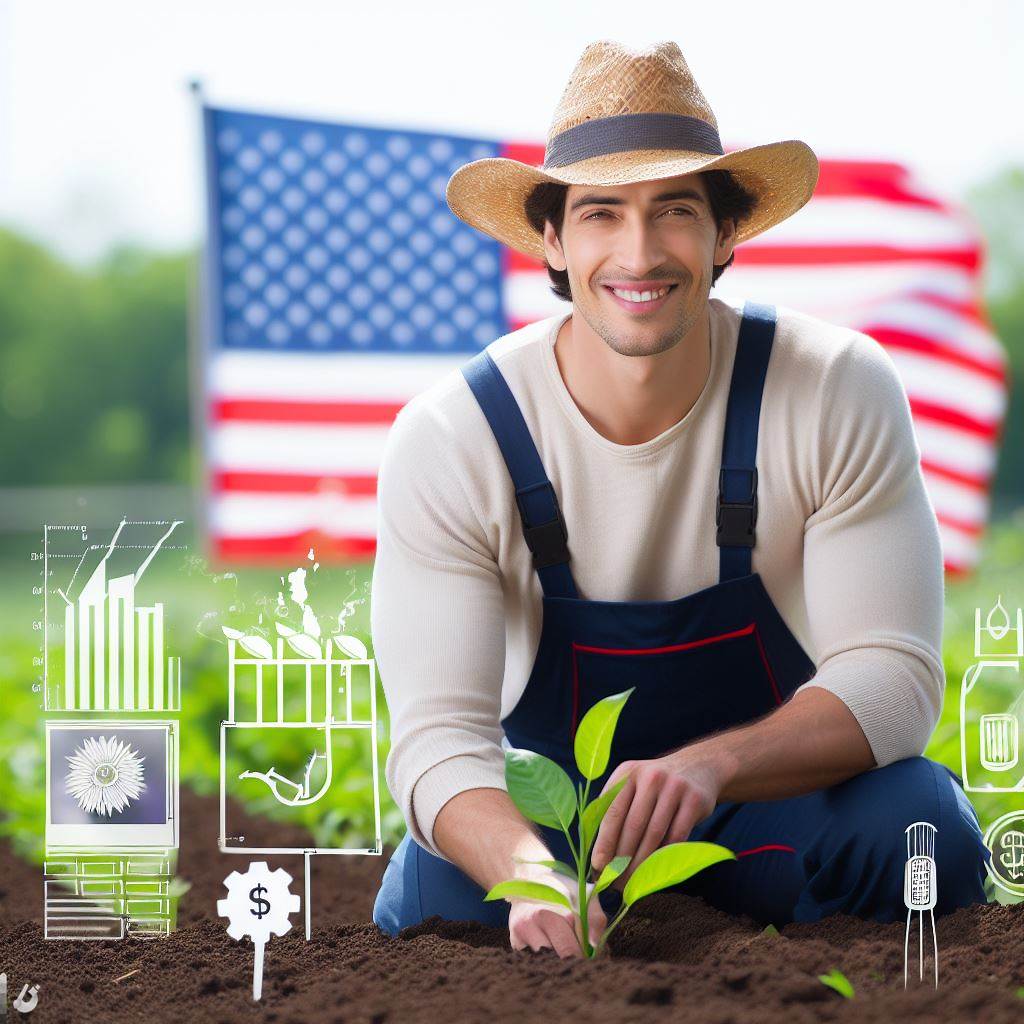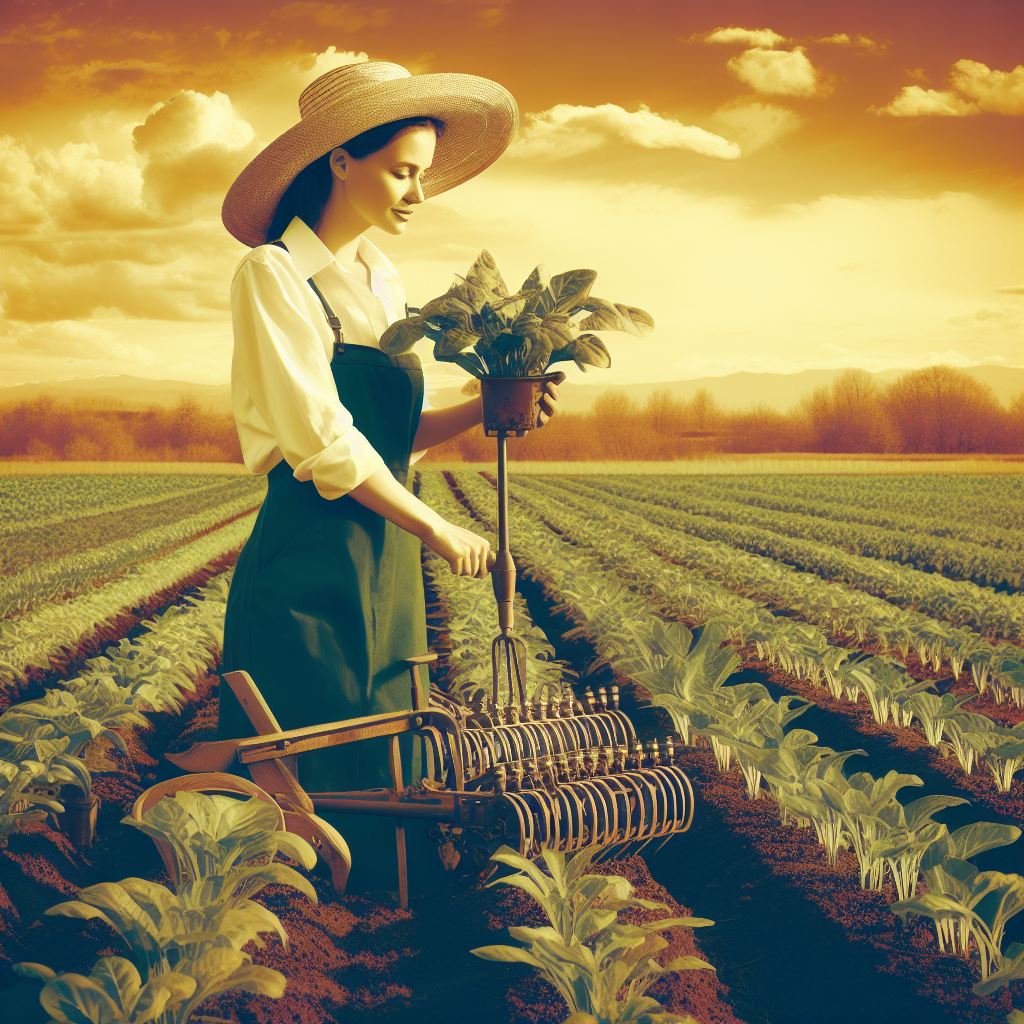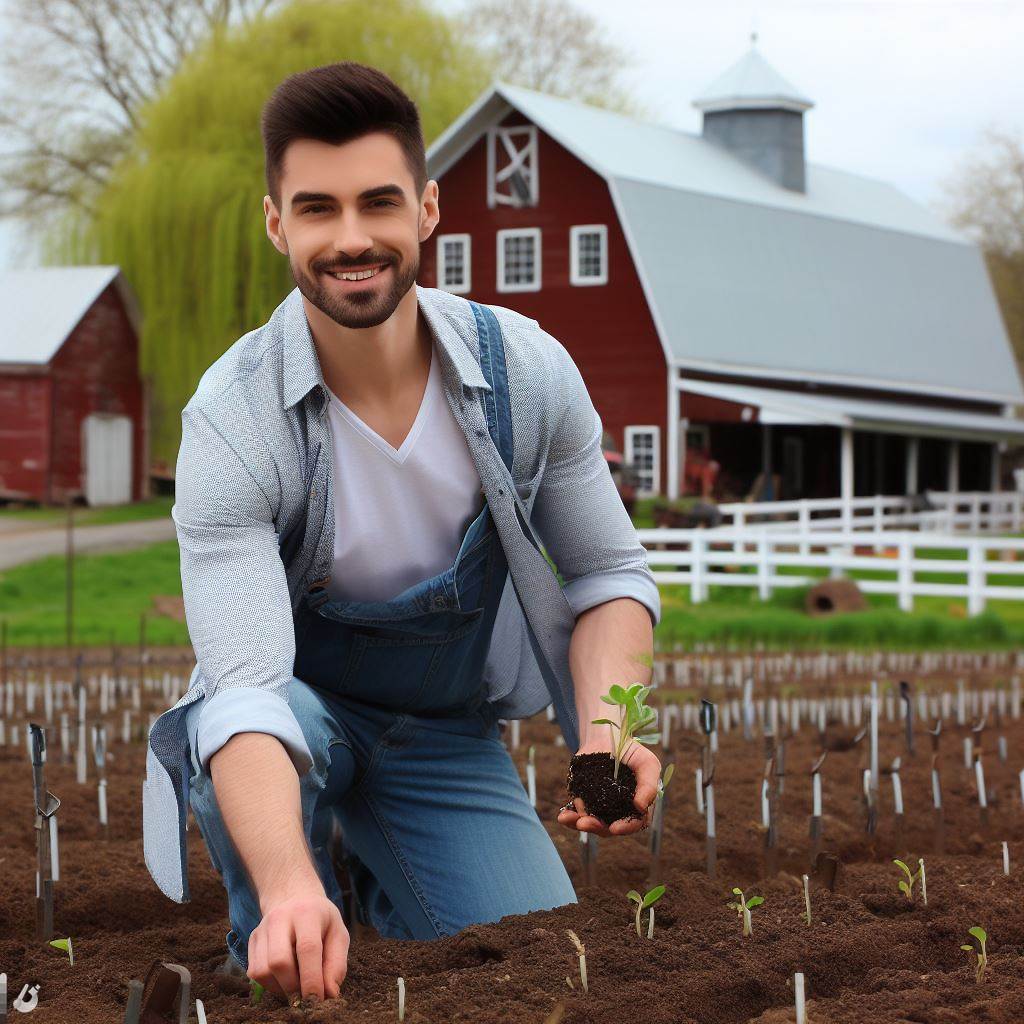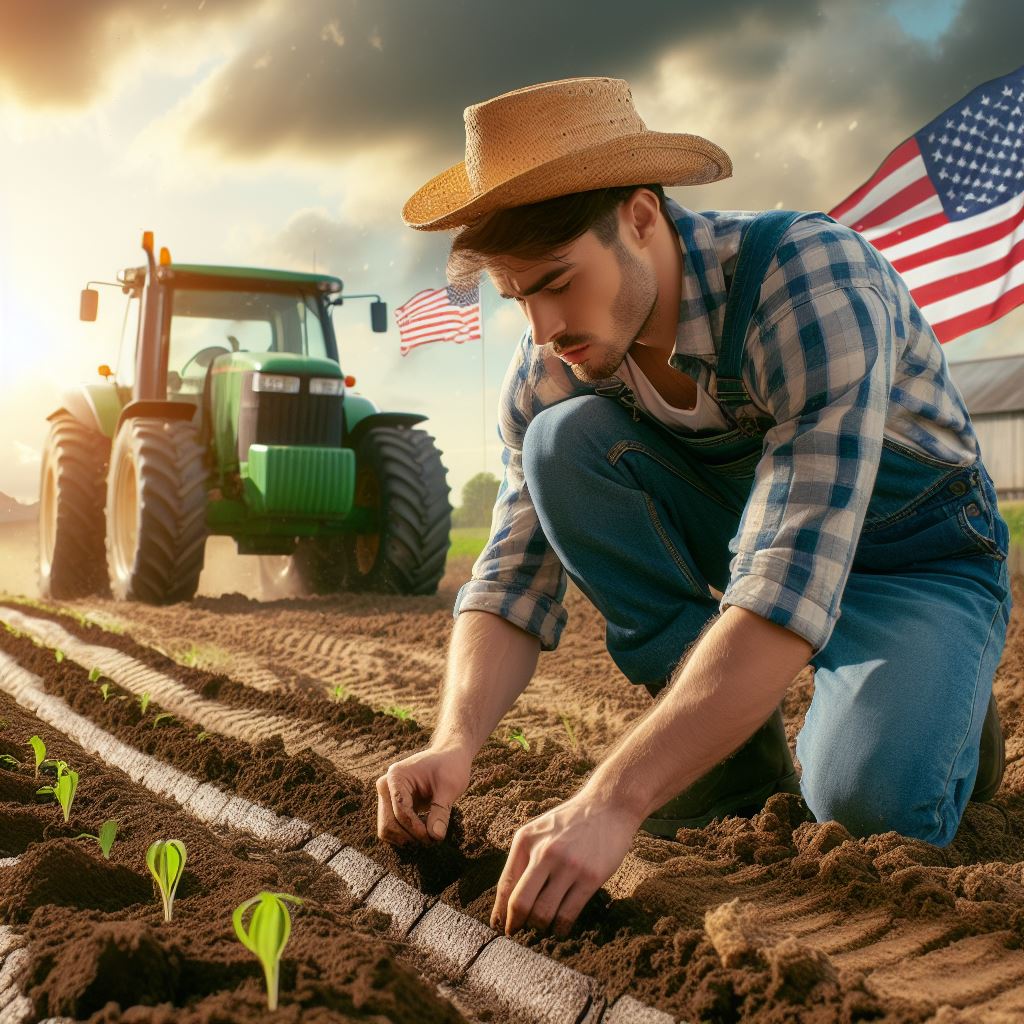Introduction
Fields of Green: A Young Farmer’s Tale is a captivating book that offers a glimpse into the life of a young farmer named Mark.
Throughout the story, Mark shares his experiences, struggles, and triumphs as he navigates the complexities of modern agriculture.
The book highlights the challenges faced by young farmers today, such as limited access to resources, climate change, and market competition.
The relevance of this book lies in its ability to shed light on the vital role that farmers play in our society.
As urbanization and industrialization continue to prevail, it is crucial to understand the daily life and hardships of those who work the land.
Fields of Green provides a unique perspective on the agriculture industry, encouraging readers to appreciate the dedication and passion required for sustainable farming practices.
In this blog post, we will delve deeper into the themes explored in Fields of Green.
We will discuss the importance of supporting young farmers, the impact of climate change on agriculture, and the future of sustainable farming.
By raising awareness and fostering conversation, we hope to inspire individuals to take an active role in supporting local farmers and promoting environmentally friendly farming methods.
Understanding the challenges faced by young farmers is the first step towards building a resilient and sustainable agricultural sector.
Join us as we explore the world of farming through the eyes of Mark and gain a greater appreciation for the Fields of Green.
Background of the Young Farmer
Meet John, the Young Farmer
John is a passionate and driven young farmer who grew up in a small rural town.
Born and raised in a family with a long farming tradition, John developed a deep love for the land from a young age.
With his warm smile and calloused hands, John embodies the resilience and dedication that farmers possess.
The Motivations and Aspirations
Driven by a desire to contribute to sustainable food production, John aims to make a positive impact.
Transform Your Agribusiness
Unlock your farm's potential with expert advice tailored to your needs. Get actionable steps that drive real results.
Get StartedJohn dreams of revitalizing local agriculture and building a strong farming community for future generations.
Passionate about organic farming, he envisions producing healthy, chemical-free food for his community.
Challenges and Obstacles in Modern Agriculture
In the face of modern agriculture, John confronts numerous challenges that threaten his dreams.
Firstly, the high cost of land makes it difficult for young farmers like John to start their own farms.
Additionally, the lack of access to affordable loans and capital limits John’s ability to invest in necessary equipment.
Moreover, intense competition from large-scale industrial farms often leaves small farmers struggling to survive.
Climate change poses another obstacle, with irregular weather patterns and extreme conditions affecting crop yields.
Lastly, navigating complex regulations and acquiring certifications for organic farming adds another layer of difficulty for John.
Despite these challenges, John remains resilient, continuously seeking innovative solutions and adapting to change.
Through networking with other farmers and seeking mentorship, he develops strategies to overcome these obstacles.
In fact, John is a determined young farmer with a strong commitment to sustainable agriculture.
While he faces various challenges, his passion, aspirations, and resilience serve as guiding forces on his farming journey.
Transitioning into Sustainable Farming Practices
The young farmer’s journey towards sustainable farming methods
The young farmer embarked on a transformative journey towards sustainable farming practices.
He recognized the importance of preserving the environment and wanted to make a positive impact.
Initially, he faced challenges understanding sustainable farming techniques and their implementation.
Through extensive research and guidance from experienced farmers, the young farmer gradually learned.
He attended workshops, conferences, and engaged in conversations with experts in the field.
Implementing sustainable practices required adapting to new techniques, which demanded patience and perseverance.
He struggled initially but slowly began incorporating sustainable methods into his farming practices.
The young farmer experimented with cover crops, crop rotation, and reduced chemical inputs to improve sustainability.
He discovered that sustainable farming not only protected the environment but also enhanced soil health.
The young farmer’s journey towards sustainable farming reflected his dedication to creating a more sustainable future.
The reasons behind transitioning to sustainable practices
- The need for sustainable farming practices arises due to the detrimental effects of conventional farming on the environment.
- Chemical fertilizers and pesticides used in conventional farming contribute to water and soil pollution.
- Transitioning to sustainable practices reduces reliance on harmful chemicals, promoting a healthier ecosystem.
- By implementing sustainable farming methods, farmers can minimize soil erosion and degradation.
- Transitioning to sustainable practices also ensures long-term food security and resilience to climate change.
- The young farmer recognized these reasons and embraced sustainable farming for the sake of future generations.
The benefits and advantages of sustainable farming
- Sustainable farming enhances soil fertility, leading to higher crop yields and improved agricultural productivity.
- It promotes biodiversity by providing a habitat for beneficial insects, birds, and other wildlife.
- With reduced use of chemical inputs, sustainable farming produces healthier and safer food for consumption.
- It contributes to cleaner water sources and reduces the risk of contamination from agricultural runoff.
- By using renewable energy sources and efficient water management systems, sustainable farming minimizes resource wastage.
- Employing sustainable practices enhances the resilience of farming systems to climate change impacts.
- Sustainable farming practices also foster a sense of stewardship towards the land and the environment.
- Furthermore, sustainable farming can create new opportunities for rural communities and strengthen local economies.
- Transitioning to sustainable practices benefits not only the farmer but also the community and the planet.
Transitioning into sustainable farming practices is a vital step in ensuring a better future.
The young farmer’s journey showcases the importance of embracing sustainability.
Showcase Your Farming Business
Publish your professional farming services profile on our blog for a one-time fee of $200 and reach a dedicated audience of farmers and agribusiness owners.
Publish Your ProfileBy adopting sustainable methods, farmers can protect the environment, improve soil health, and contribute to global food security.
Read: The Apple Orchard: Seasons of Hardship
Implementing Organic Farming Techniques
The organic farming techniques adopted by the young farmer
- Integrated Pest Management (IPM): Using natural predators and crop rotation to control pests.
- Companion Planting: Planting different crops together to enhance growth and deter pests.
- Composting: Utilizing organic waste to create nutrient-rich compost for the soil.
- Cover Cropping: Planting cover crops to prevent soil erosion and improve soil fertility.
- Crop Rotation: Rotating crops to disrupt pest and disease cycles and maintain soil health.
- Biological Control: Employing beneficial insects to control pests naturally.
The advantages and challenges of organic farming
Advantages
- Healthier Food: Organic farming practices result in nutritious and chemical-free produce.
- Environmental Protection: Avoiding synthetic pesticides and fertilizers helps preserve ecosystems.
- Soil Preservation: Organic methods promote soil health and prevent erosion.
- Supporting Wildlife: Organic farms provide habitats and contribute to biodiversity.
Challenges
- Higher Labor Costs: Organic farming often requires more manual labor, increasing production expenses.
- Lower Yields: Organic farms may experience slightly lower crop yields compared to conventional methods.
- Market Demand: Finding a consistent market for organic produce can be challenging.
- Transition Period: Switching from conventional to organic farming takes time and initial investment.
Success stories or positive outcomes resulting from organic practices
- The young farmer, Jake, noticed a significant improvement in soil quality after implementing organic techniques. The soil became richer and more fertile, allowing for greater crop yields.
- Jake also observed an increase in beneficial insects on his farm. By avoiding chemical pesticides, he created a balanced ecosystem where natural predators helped control pests.
- The organic farm attracted a loyal customer base who appreciated the high-quality produce. Jake’s commitment to sustainable farming practices resonated with consumers, resulting in increased sales.
- Through crop rotation and cover cropping, Jake successfully managed to control weed growth naturally. This reduced the need for herbicides, minimizing environmental impact and increasing cost savings.
- By adopting organic farming techniques, Jake played a part in protecting the environment. His farm became a safe haven for wildlife, attracting various species and contributing to biodiversity.
- Over time, Jake noticed a decline in the occurrence of crop diseases. The organic practices he implemented created a resilient ecosystem that naturally suppressed diseases, reducing the need for chemical interventions.
- Jake’s success with organic farming techniques inspired neighboring farmers to consider transitioning to organic methods. He became a source of knowledge and support, fostering a community of sustainable agriculture.
Implementing organic farming techniques has had a profound positive impact on Jake’s farm.
Through dedication and perseverance, he has not only improved the quality of his produce but also contributed to a sustainable and eco-friendly agricultural system.
Read: Cattle Trails: A Rancher Life and Work

Incorporating Technology in Farming
Utilizing Technology in Farming Operations
The young farmer in “Fields of Green” embraces technology to enhance their farming operations.
Using smartphones and tablets, the farmer accesses weather and market data.
They also employ drones with cameras to monitor crop health, detect diseases, and track livestock.
Additionally, automated watering systems and robotic milking machines streamline tasks and increase efficiency on the farm.
Benefits and Drawbacks of Implementing Technology
Implementing technology in farming brings numerous benefits.
Access to real-time data improves decision-making, enabling the young farmer to optimize crop yield and minimize losses.
Efficiency gains through automation save time and labor costs.
Moreover, technology offers better traceability of products, improves farm management, and reduces environmental impact.
However, there are drawbacks to consider. Initial investment costs for technology can be high, especially for small-scale farmers.
Technical glitches and reliance on electricity and stable internet connections might also pose challenges.
Finally, there is a concern that excessive reliance on technology may weaken traditional farming skills and knowledge.
Impact of Specific Technologies Used on the Farm
The young farmer employs several specific technologies that impact their farm positively:
- Weather Apps: Access to real-time weather data helps the farmer plan irrigation and spraying activities, reducing water and chemical usage.
- Market Data Analysis Tools: By analyzing market trends and demands, the farmer can make informed decisions on pricing and crop selection, maximizing profits.
- Drones with Cameras: These unmanned aerial vehicles provide a bird’s-eye view of the farm, identifying pest infestations, unhealthy crops, or grazed areas in need of rest.
- Automated Watering Systems: These systems ensure efficient water usage by only irrigating when needed, conserving water resources and reducing costs.
- Robotic Milking Machines: These machines significantly reduce labor requirements and improve milk quality by automating the milking process.
Overall, incorporating technology in farming has transformed the young farmer’s operations, allowing for improved efficiency, enhanced decision-making, and more sustainable practices.
However, careful consideration of costs, potential drawbacks, and finding the right balance between traditional methods and technology is crucial for long-term success.
Read: From Seeds to Success: An Organic Farmer
Building Community Relationships
Young Farmer’s Efforts to Engage with the Local Community
Building strong relationships with the local community has been a top priority for the young farmer.
Since starting his journey in sustainable agriculture, he saw the significance of involving the community in his work.
Through various initiatives, he has fostered a sense of connection and belonging among locals.
One way he engages with the community is by hosting open farm days, where people are invited to visit his farm.
During these events, he gives tours, organizes workshops, and educates visitors about sustainable farming practices.
The young farmer also participates in local farmers’ markets where he sells his organic produce.
This allows him to interact with customers directly and share his farming experiences and knowledge.
Importance of Community Support in Sustainable Agriculture
Community support plays a vital role in the success of sustainable agriculture.
The young farmer believes that local support is crucial in ensuring the long-term viability of his farm.
He relies on the community’s trust and patronage to sustain his operations.
By supporting local farmers, people contribute to preserving agricultural lands and promoting environmentally friendly practices.
Additionally, the community’s interest in locally sourced, organic produce is a driving force behind sustainable farming.
Without their support, the young farmer acknowledges that his work would be much more challenging.
Sharing Examples of Collaborations or Partnerships with Other Farmers or Organizations
In his efforts to strengthen community relationships, the young farmer often collaborates with other farmers and organizations.
He recognizes that working together enables them to achieve common goals more effectively.
One collaboration involves a neighboring farmer who specializes in dairy production.
They occasionally exchange resources, such as manure for fertilizer, creating a mutually beneficial relationship.
The young farmer has also partnered with local schools to develop educational programs about sustainable agriculture.
Together, they teach students about the importance of farming practices that protect the environment.
In addition to these collaborations, the young farmer actively participates in agricultural organizations and associations.
Showcase Your Farming Business
Publish your professional farming services profile on our blog for a one-time fee of $200 and reach a dedicated audience of farmers and agribusiness owners.
Publish Your ProfileHe attends meetings, workshops, and conferences where he connects with like-minded individuals and expands his knowledge.
Through these partnerships, the young farmer strengthens the bonds within the community and contributes to the growth of sustainable agriculture.
In summary, the young farmer’s commitment to engaging with the local community is commendable.
His efforts to foster relationships, educate, and collaborate not only benefit his farm but also promote sustainable agriculture.
By involving the community, the young farmer ensures the long-term viability of his operations and supports the growth of a greener future.
Read: Grape Expectations: A Vintner Journey
Future Plans and Outlook
The young farmer’s future plans and goals
- The young farmer, Brian, envisions expanding his sustainable farming practices and increasing his farm’s productivity.
- He plans to invest in advanced irrigation systems and experiment with new crop varieties for better yield.
- Brian aims to establish direct-to-consumer sales channels, such as a farm stand and CSA programs, to reach more customers.
- Expanding his organic certification and becoming a leading supplier of organic produce is also part of Brian’s future goals.
- He desires to create a diverse and resilient farm that can adapt to climate change and sustain itself for generations to come.
Innovations or projects the farmer has in mind
- Brian envisions implementing hydroponic systems to grow crops vertically, making efficient use of limited land resources.
- He plans to integrate renewable energy sources like solar panels, reducing the carbon footprint of his farm.
- The young farmer is also exploring the possibility of using drones for monitoring crop health and precision agriculture.
- Investing in smart technology, such as automated irrigation and sensor-based monitoring, is on Brian’s radar.
- He plans to conduct educational workshops and open the farm for agritourism to promote sustainable farming practices.
The potential impact of the young farmer’s story on the farming community
- The inspiring story of Brian’s passion and success could motivate other young individuals to pursue farming.
- His emphasis on sustainable practices may encourage more farmers to adopt eco-friendly techniques, benefiting the environment.
- Brian’s innovations and projects can serve as a model for others, fostering creativity and advancement in the agricultural sector.
- The young farmer’s involvement in the local community and sharing of knowledge can strengthen the farming network.
- By prioritizing organic farming and providing local, fresh produce, Brian contributes to improved food security and public health.
Overall, Brian’s future plans reflect his commitment to sustainable farming and continuous improvement.
His innovative projects have the potential to revolutionize farming practices and inspire others in the community.
With his dedication to organic production and community engagement, he is poised to make a lasting impact on the farming industry.
Conclusion
In this blog post, we explored ‘Fields of Green: A Young Farmer’s Tale’ and highlighted important points.
In our journey through “Fields of Green,” we explored the dynamic world of a young farmer. From dawn plows to sunset harvests, we witnessed the resilience and passion defining their story
Young farmers play a crucial role in sustainable agriculture, bringing innovation and fresh perspectives.
Young farmers inject vitality into sustainable agriculture. Their innovation and dedication shape the future of farming, fostering environmental stewardship and food security.
Now, more than ever, support local farmers. Embrace sustainable practices. Every choice sustains not just crops but the livelihoods and dreams of those cultivating our fields.
The young farmer’s tale is a call to sow seeds of change. Join the narrative; reap a future of greener pastures.
We encourage readers to support local farmers and embrace sustainable farming practices to ensure a greener future.




